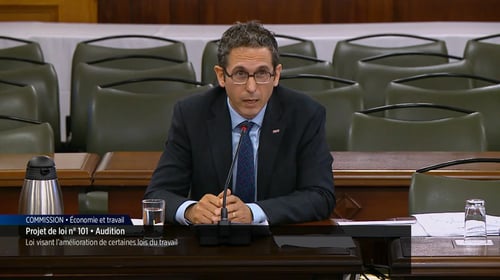Act respecting collective agreement decrees applied by parity committees: a uniquely Quebec burden in North America
The Act Respecting Collective Agreement Decrees applied by parity committees came into force on April 20th, 1934.
The Act respecting collective agreement decrees applied by parity committees
The Act Respecting Collective Agreement Decrees allows the working conditions negotiated by a group of employers and unions to be imposed on an entire sector — which may be regional in scope. When this law was adopted in 1934, labour protection laws did not exist. Today, Quebec is one of the jurisdictions in North America with the most generous social safety net.
This regulatory framework imposes a significant administrative burden, a sector-specific payroll tax, a loss of flexibility, and unfair competition between SMEs that are subject to the decree and those that are not. According to our estimates, this unique regime — which affects approximately 10,000 businesses — creates an annual burden of $47 million.
This system is currently facing a crisis of confidence among affected businesses and does not reflect the principles of sound governance. The parity committees that enforce this regulation are not subject to the Act Respecting the Citizen’s Protector or the Access to Information Act. Moreover, these parity committees are made up of employers and unions — meaning that those who impose the regulations are both judge and party, raising serious concerns about impartiality.
According to a CFIB survey, the primary demand from businesses subject to the decree is simply to abolish the Act altogether. This is exactly what CFIB is calling for.
Our position
CFIB urges the government to abolish the Act respecting collective agreement decrees applied by parity committees. Not only does it harm SMEs’ competitiveness, it creates inequalities between businesses and grants excessive power to parity committees which lack transparency.
Sign our petition against red tape
Quebec is the only province with several burdensome, province-specific rules — such as the Act Respecting Collective Agreement Decrees.
Want to see change? Add your voice now by signing our petition.
- Brief
Consultation publique portant sur le projet de loi no° 101, Loi visant l’amélioration de certaines lois du travail, May 2025 (in French only) - Case study
Loi sur les décrets de convention collective : un fardeau important pour nos entreprises aujourd’hui, October 2024 (in French only) - Report
Loi sur les décrets de convention collective : crise de confiance et de légitimité pour les PME assujetties, September 2023 (in French only)
CFIB's legislative work
Media Centre:
- PL 101 : de bonnes mesures proposées par le ministre Boulet, mais encore une occasion manquée d’abolir la LDCC: May 30, 2025 (in French only)
- Adoption du projet de loi 85 : une action qui fait une différence pour les PME: April 9, 2025 (in French only)
- La FCEI appuie le PL 89 et demande au ministre Boulet de compléter son travail: March 18, 2025 (in French only)
- Réaction de la FCEI au dépôt du projet de loi 89, Loi visant à considérer davantage les besoins de la population en cas de grève ou de lockout: February 19, 2025 (in French only)
- Projet de loi 85 : des allègements réglementaires qui vont augmenter la productivité des PME: February 11, 2025 (in French only)
- Crise de gouvernance et de légitimité : les entrepreneurs souhaitent en finir avec la Loi sur les décrets de convention collective: October 21, 2024 (in French only)
- Projet de loi 17 : le gouvernement ouvre la voie pour redonner du temps aux entrepreneurs: October 25, 2023 (in French only)
- Loi sur les décrets de convention collective : 1 500 pétitions pour l’abolir ont été déposées à Jean Boulet, ministre du Travail: October 3, 2023 (in French only)
- Projet de loi 17 : des mesures prometteuses pour les PME du Québec: September 20, 2023 (in French only)
- Loi sur les décrets de convention collective : un système opaque datant d’un autre siècle, qui n’a plus sa raison d’être: September 19, 2023 (in French only)
- Réforme de la gouvernance des comités paritaires : une couche de peinture sur une fondation fissurée, selon la FCEI: May 18, 2022 (in French only)
Legislative references
Description of the LDCC from LégisQuébec
LégisQuébec is the Quebec government’s official site where all laws and regulations in effect in the province can be viewed.
Through LégisQuébec, you can:
- View the provisions of official Quebec laws and regulations (e.g., Labour Code, LDCC)
- View current and previous versions
- Monitor legislative changes over time
- Search for sections/provisions by key word, chapter, title of the law, etc.
Parity committee directory
This directory (in French only) lists the following for every parity committee in Quebec: the title of the applicable decree, the contact information for the head of the committee, and the applicable territory.
CFIB’s Key Efforts Regarding the LDCC:
2025 highlights
June 25, 2025
We met with Labour Minister Jean Boulet.
June 11, 2025
The Comité-conseil sur l’allègement réglementaire et administratif, co-chaired by François Vincent, Vice-President, Quebec at CFIB, met and discussed the need to have the LDCC repealed as part of the next omnibus bill planned in the fall of 2025.
May 29, 2025
CFIB filed a brief as part of public consultations on Bill 101, An Act to improve certain labour laws. In the Parliamentary Committee, we urged the government to amend Bill 101 in order to eliminate the LDCC and align Quebec’s legal framework with that of other North American jurisdictions. See us in action (in French only).

March 27, 2025
We submitted 2 critical analyses on the LDCC to Labour Minister Jean Boulet and Minister for the Economy Christopher Skeete, as well as a formal request to have the LDCC eliminated.
March 17, 2025
CFIB filed a brief as part of public consultations on Bill 89, An Act to give greater consideration to the needs of the population in the event of a strike or a lock-out. In Parliamentary Committee, we drew attention to the crisis of confidence and governance related to the LDCC. See us in action (in French only).

March 12, 2025
We carried out an economic analysis of LDCC-related costs for businesses that are subject to collective agreement decrees in Quebec, based on a survey we conducted from February 28 to March 10, 2025.
February 7, 2025
CFIB filed a brief as part of private consultations on Bill 85, An Act to amend various provisions for the main purpose of reducing regulatory and administrative burden. In Parliamentary Committee, CFIB recommended the government use Bill 85 as an opportunity to repeal the LDCC. See us in action (in French only).

2024 highlights
November 29, 2024
We sent a letter to Labour Minister Jean Boulet requesting access to information about the board members of all parity committees over the past 25 years.
October 11, 2024
We met with Labour Minister Jean Boulet to share the results of our case study.
October 2, 2024
We sent a case study to Labour Minister Jean Boulet which presents the perspectives of small business owners who are subject to various collective agreement decrees.
April 29, 2024
We sent a letter to Quebec’s Auditor General Guylaine Leclerc to request a thorough review of the use of funds collected by parity committees under the LDCC.
2023 highlights
November 2, 2023
We met virtually with the Competition Bureau to discuss our members’ concerns about parity committees and their use of the LDCC.
October 3, 2023
We submitted the 1,500 petitions signed by our members urging the government to abolish the LDCC to Labour Minister Jean Boulet.

September 25, 2023
We sent a letter to the Honourable François-Philippe Champagne, Minister of Innovation, Science and Industry, to share our concerns about the LDCC being used to create unfair competition.
September 20, 2023
We submitted the 1,500 petitions signed by our members who are subject to the LDCC and to parity committees during a hearing about Bill 17 before the Assemblée nationale.

September 19, 2023
We released our report on the LDCC.
September 7, 2023
We sent a letter to Labour Minister Jean Boulet requesting access to the documentation from his Department’s investigation on parity committees.
September 1, 2023
We met with Labour Minister Jean Boulet.

February 27, 2023
We met with Labour Minister Jean Boulet and handed him the 1,247 petitions signed by small business owners subject to the LDCC.

2022 highlights
November 25, 2022
We met with Labour Minister Jean Boulet.

November 7, 2022
We sent a survey on parity committees to our members who are subject to the LDCC.
September 28, 2022
We put out a petition about the LDCC as applied by parity committees.
May 18, 2022
Parity committee governance reform: a temporary fix, according to CFIB.
January 10, 2022
We met virtually with Revenu Québec to discuss the administrative and financial burdens related to parity committee fees.
2021 highlights
December 6, 2021
We met with Labour Minister Jean Boulet.

April 22, 2021
We emailed a petition to our members who are subject to the LDCC.
January 15, 2021
We sent a letter to Labour Minister Jean Boulet, urging the government to eliminate the LDCC or set up a major consultation with businesses that are subject to it.
2020 highlights
July 21, 2020
We sent a letter to Labour Minister Jean Boulet about proposed amendments to the Decree respecting the automotive services industry in the Arthabaska, Granby, Sherbrooke and Thetford Mines regions.
June 30, 2020
The Decree respecting hairdressers in the Outaouais region was eliminated, finally freeing small businesses from outdated regulations.
April 2, 2020
We sent a letter to the Labour Minister requesting that the Decree respecting hairdressers in the Outaouais region be eliminated.
Be part of the largest small business organization in Canada.
Join more than 100,000 successful independent businesses who benefit from personalized advice, exclusive savings and a strong voice in government.
